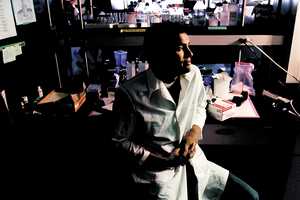NRI
US Scholar, triple- major wins prestigious UK scholarship
Arizona, Dec. 16, 2005
Ramwsh Parikh
NRI press
NRI, (non-resident Indian), Flinn Scholar Ajit Divakaruni
was named one of 40 recipients of the Marshall Scholarship.
Marshall Scholarships finance young Americans of high
ability to study for a degree in the United Kingdom.
At least forty Scholars are selected each year to
study either at graduate or occasionally undergraduate
level at an UK institution in any field of study.
Each scholarship is held for two years. Divakaruni
is Arizona's only Marshall Scholar this year and the
first Arizonan to receive it in three years.
Divakaruni, 22-year-old senior is a mathematics,
biochemistry and molecular and cellular biology triple
major at the UA and is set to become the university's
first student ever to finish an honors thesis in three
majors. He will graduate from University of Arizona
with degrees in biochemistry, mathematics, and molecular
and cellular biology, will use the Marshall to pursue
a doctorate in biochemistry at University of Cambridge

Two years ago Flinn Scholar Ajit Divakaruni, a University
of Arizona undergraduate, went out on a whim and contacted
a world-renowned biochemist, asking him for a spot
in his lab.
Dr. Martin Brand, a leading expert in mitochondria
and energy regulation at the University of Cambridge,
granted Divakaruni's request and brought him on to
work for six months as a full-time research student.
Next year Divakaruni will return to Brand's lab to
continue his work in the biosciences. But this time
he will not only have the support of Brand but also
the backing of one of the country's most prestigious
scholarships--the Marshall Scholarship.
For Divakaruni, who is triple-majoring in biochemistry,
mathematics, and molecular and cellular biology, the
opportunity to pursue a doctorate in biochemistry
at University of Cambridge will be invaluable preparation
for a future career in developing treatments for diabetes
and obesity.
"Estimates have placed the number of individuals
that will be affected by diabetes and obesity at close
to 300 million worldwide in the next twenty years,"
he said. "There is so much potential for people
entering this area of research."
Specifically, under Brand, Divakaruni will take an
interdisciplinary approach to studying proteins that
have the potential, if altered, to treat diabetes
and obesity. Divakaruni will incorporate experimental
chemistry, protein design techniques, and mathematical
modeling into his doctoral program.
Leading into this research are projects Divakaruni
has already done. For over two years he worked to
construct a mathematical model of tumor metabolism.
After studying UCP activation for six months in Brand's
lab, Divakaruni moved on to Yale University where
he studied under another leading bioscientist, Lynne
Regan, an authority on protein design.
In Regan's lab, Divakaruni worked individually on
a bioinformatics project among eight postdoctoral
researchers. Bioinformatics is the management and
analysis of data using advanced computing techniques
for biological research.
Divakaruni spent two years researching in the physiology
lab of UA professor Tim Secomb before he left for
Cambridge, where he joined the lab of biochemist Martin
Brand.
There he studied regulatory proteins in the body's
pathways where food is turned into energy. The proteins
are attractive therapeutic targets for diseases such
as diabetes and obesity. Scientists are starting to
understand what the proteins do but haven't yet unraveled
how they work.
The proteins may also have an impact on harmful free
radicals created in the body as part of the conversion
of glucose to energy.
Divakaruni calls his experience in Regan's lab one
of the "single greatest challenges" of his
academic life. He is currently preparing a single-author
manuscript under her supervision.
Divakaruni's ultimate goal is to continue his research
at a large state university. The Flinn Scholar, who
kept a cactus on his desk while working in Cambridge
last year, has his sights set on returning to Arizona.